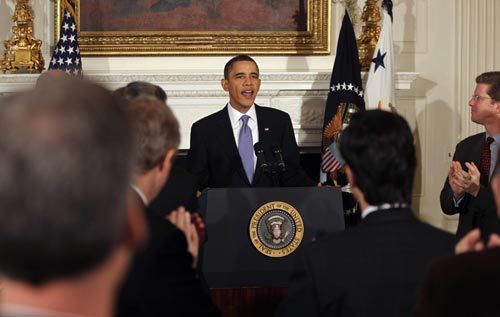Obama releases health care reform proposal
U.S. President Barack Obama Monday released a health care reform proposal in an attempt to save the bill that has been stuck in Congress since the Democratic Party lost the absolute majority in the Senate.
 |
|
U.S. President Barack Obama speaks at a meeting with state governors in the State Dining Room of the White House in Washington, February 22, 2010. [Xinhua/Reuters Photo] |
"President has now put forth a proposal that incorporates the work the House and the Senate have done and adds additional ideas from Republican members of Congress," said the proposal posted on the White House official website.
"The proposal will make health care more affordable, make health insurers more accountable, expand health coverage to all Americans, and make the health system sustainable, stabilizing family budgets, the federal budget and the economy," it said.
However, the proposal did not receive welcome from the Republican side.
"In short, President's proposal continues to defy the will of the American people and contradict longstanding federal policy by providing federal subsidies to private health plans that cover elective abortions," said House Republican Leader John Boehner.
He pointed out that the proposal still uses government funds to subsidize elective abortion, although it includes a "state op-out" provision if a state passes a law to prohibit insurance coverage of abortion.
"The president has crippled the credibility of this week's summit by proposing the same massive government takeover of healthcare based on a partisan bill the American people have already rejected," he added.
The proposal was made public days before a bipartisan meeting on the health care reform, which will be broadcast live across the nation.
President Obama hopes that Republicans can also make public their version of health reform proposal prior to the meeting to allow American public to be thoroughly informed of the issue, said a White House official earlier on Monday at a teleconference.
The proposal features five accomplishments that aim at putting American families and small business owners in control their own health care.
It will make insurance more affordable with one of the largest middle class tax cut for the health care in history and cover 31 million Americans who are currently uninsured.
The proposal will also set up a new competitive health insurance market that can offer Americans more options, though it does not include the public option that Obama's initial proposal had.
It can lead to the reduction of the deficit by 100 billion dollars in the first decade and about 1 trillion dollars over the second.
The House of Representatives and the Senate has separately passed their own version of the health care reform bill but the unified version was stalled in Congress after Scott Brown, a Republican, won the special election for a Senate seat in Massachusetts, ending Democratic Party's supermajority status in the floor.
Obama said in his first State of Union on Jan. 27 that he would be seeking bipartisan cooperation to push forward with the legislations.
To seek agreement with Republicans on health care reform, Obama administration include some ideas from the rival camp in the proposal, such as establishing a comprehensive Medicare and Medicaid sanctions database and using of technology for real-time data review.
On the other hand, Republicans have made clear the areas they can agree, including access for all individuals to health care, joint efforts by individuals, small business and other groups to get health insurance at lower cost.
They staunchly opposed the government-run health care that might leave the insurance more expensive and create more bureaucracies.
 0
0 






